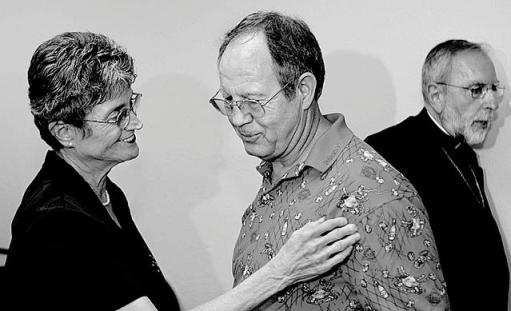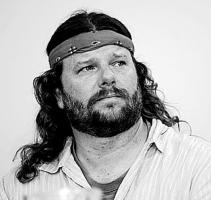Abuse victims' lives to change
Diocese's checks due next month
By Stephanie Innes
Arizona Daily Star
September 24, 2005
http://www.azstarnet.com/sn/related/94767
Alonso Hernandez is clear about his goals: to learn automotive repair,
rent his own apartment and permanently shed the devastating secret that
haunted him through 10 years of childhood.
Now that the Roman Catholic Diocese of Tucson's Chapter 11 bankruptcy
case is officially over, Hernandez, 21, is about to get some help in moving
forward - a $600,000 settlement from the diocese that he's scheduled to
receive, minus legal fees, next month.
The settlement amount could increase to nearly $1 million, as more payments
from the bankruptcy fund are expected to be disbursed over the next few
years.
 |
| Chancellor June Kellen of the Diocese of Tucson extends her good wishes to Thomas A. Groom, one of the settlement recipients. Photo by Benjie Sanders / Arizona Daily Star. |
"I'm going to quit work and start at school right away," said
Hernandez, a machinery maintenance worker. "I've already had a couple
of months of therapy, so I'm ready now to move on. I won't have to worry
about getting a call about going to court and retelling everything. There's
no reason I have to think about it anymore."
Hernandez, now living in Salinas, Calif., is one of five young men who
were molested as children by a Yuma Catholic priest and will each receive
an initial disbursement of $600,000. That's the largest initial payment
anyone is getting from an estimated $22.3 million settlement pool the
diocese set up as part of its Chapter 11 reorganization.
Three of the young men are brothers whose parents are also receiving a
settlement in the case. All together, that family could end up with about
$2 million in initial distributions, minus legal fees. Lawyers' fees are
typically one-third to 40 percent of the settlement amount.
|
|||
| Troy Gray, left, Brian O'Connor and Michael Moylan are awaiting settlement checks from the Roman Catholic Diocese of Tucson. Photos by Benjie Sanders / Arizona Daily Star. |
Plaintiffs' lawyers say the per-person settlement amounts in the case
are not as large as they were in 2002 when the diocese agreed to pay $14
million to 10 men and six of their family members. That settlement followed
lawsuits claiming the men were abused by four members of the local clergy
during the 1960s, '70s and '80s. The per-person amount was slightly more
than $1 million.
But the compensation in the bankruptcy case is far higher than anyone
had expected, say plaintiffs' lawyers, who also say settlements are closely
comparable to other cases around the country. Also, settlements could
increase in the next few years if money set aside for minors and unknown
future claimants goes unused.
"The church publicly acknowledged wrongdoing," said attorney
Kim E. Williamson. "Now our clients don't have to wait years and
years and ultimately risk losing at trial on technical statute of limitations
defenses that the church raised in almost all the cases."
Along with law partner Lynne M. Cadigan, Williamson represented 30 plaintiffs
who will receive most of the settlement money that the diocese's trust
is expected to pay out in a few weeks' time. The victims' ages range from
12 to 54.
"It's a very good result," Williamson said. "This is a
mission diocese with few assets, and when all the dust settles people
are going to be getting more than what most plaintiffs got in other high-profile
cases, like Boston."
In 2003 the Roman Catholic Archdiocese of Boston agreed to pay $85 million
to 552 victims of sexual abuse, with most payments ranging between $80,000
and $300,000. In December 2004, the Diocese of Orange in California reached
a settlement of $100 million with 87 victims, and it's a diocese with
greater financial resources than Tucson's.
"You can't really put a monetary value on it," Williamson said.
"What would anyone take for a lost childhood? What it really boils
down to is what satisfies the victim in terms of getting justice.
"These victims didn't want to put the church out of existence. Holding
the church accountable and an admission of wrongdoing was a big part of
it for them."
For Troy Gray, 36, an initial settlement of $300,000 minus legal fees
will enable him to do what he's wanted but been unable to do since his
teens - take a month's hiatus from his life in Colorado, where he is a
part-time musician and assistant manager at a ski resort.
"I'm going to travel, disappear. This is an important transition
in my life," said Gray, who filed an abuse claim over molestations
by the Rev. Kevin Barmasse, a youth group leader at St. Elizabeth Ann
Seton Church on the Northwest Side during the 1980s.
A settlement of $425,000 minus legal fees will enable 54-year-old Thomas
A. Groom to buy his younger brother a Harley-Davidson motorcycle. It will
also help him pay off his mortgage.
Both Groom and his brother filed claims that they were sexually abused
by the Rev. Robert Gluch at a church in Phoenix during the 1960s, when
Phoenix churches were part of the Diocese of Tucson. Groom's brother is
one of 20 people getting "compromise claims" of $15,000 apiece.
The diocese gave those to people whose claims were barred by the statute
of limitations but whose allegations of sexual abuse appeared valid.
"We all have to move forward with our lives," Groom said. "It's
a change of direction."
What the settlement money can't do is restore less tangible things, like
loving and trusting others, Cadigan said.
"Many of the victims really don't trust their own feelings of love.
When they truly love someone they don't know if they will be betrayed.
Think about how big that is," Cadigan said. "Many have a hard
time holding down a job, staying in a marriage."
Cadigan and Williamson also represented plaintiffs in the 2002 settlement.
Some of their clients have fared better than others. Many have substance
abuse problems.
David Donald Frei, who received money in the 2002 settlement, is now in
prison on a conviction of criminal trespass. Frei sued the church over
abuse by Monsignor Robert C. Trupia, who was removed from the priesthood
by Pope John Paul II in 2004.
One of the young Yuma men scheduled to receive money next month is in
jail on a charge of aggravated assault. Others have attempted suicide.
"A lot of them don't make as much money - it's harder for them to
hold a job, and it's common for them to have anger management issues and
severe depression," Cadigan said. "They are facing a lifetime
of struggling with issues. It never goes away."
At a press conference announcing the end of the bankruptcy on Tuesday,
lawyers and victims praised the diocese for completing the bankruptcy
reorganization exactly one year after filing for Chapter 11 in September
2004. Unlike Chapter 11 cases in the Archdiocese of Portland, Ore., and
the Diocese of Spokane, Wash., which are still in litigation, Tucson was
able to resolve its case with minimal acrimony.
And diocese attorney Susan Boswell's negotiations with insurers raised
nearly $15 million in settlement from insurance companies alone, which
buoyed support for a resolution.
"I know that nothing can take away the hurt and harm that happened
to you," Tucson Bishop Gerald F. Kicanas told victims on Tuesday.
"You are not at fault and you did not contribute to the hurt that
happened to you. But I hope that today will be a continuing of the healing
that will take place."
Hernandez, who grew up in a devout Mexican Catholic family, hopes that
for him the pain is over. The Yuma priest who according to police reports
abused Hernandez for years - the Rev. Juan Guillen - is in prison. Hernandez
rarely goes to church anymore.
There's only one lingering question in his mind.
"I do plan to have children, and I'm not sure about raising my kids
in the church," Hernandez said. "I still see hypocrisy."
Contact reporter Stephanie Innes at 573-4134 or at sinnes@azstarnet.com.
Any original material on these pages is copyright © BishopAccountability.org 2004. Reproduce freely with attribution.


